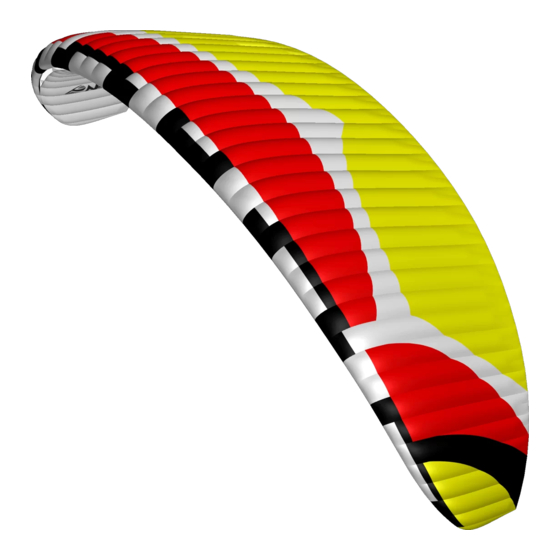Dudek Nemo 4 Passion Manuale - Pagina 16
Sfoglia online o scarica il pdf Manuale per Aerei Dudek Nemo 4 Passion. Dudek Nemo 4 Passion 20.

When piloting at high speed, with opened trimmers and/or speed
system, any steering inputs must be smooth and easy. In turbulent
air releasing trimmers should be avoided, since in case of a collapse
the canopy will behave more dynamically than during EN tests.
When flying slow (trimmers closed, position "0"), tight and effective
turns can be made with differential brakes operation. Slight use of
external brake (with engaged inner one) will compensate for loss of
lift due to bank angle. Moreover, turns can be assisted with opening
throttle, engagig speed system etc. Once with accumulated
experience you will master these techniques, you will be able to
execute smooth, fully coordinated turns.
Landing
In PPG flying there are two kinds of landing: with and without
power.
Power off landing
At an altitude of 50 metres switch the engine off and glide as you
would on a conventional paraglider. It reduces the chances of
damaging the propeller on landing, but on the other hand there is
only one attempt possible - so it has to be done right!
If the landing field is not big enough and you have to land on the
spot, we advise you to set the trimmers in 0 position (closed). It will
increase lift coefficient of the wing, effectively decreasing its sink
rate and speed. Such an action is especially important when flying
with high surface loading.
Powered landing
Make a flat approach with the engine idling, then level out and lose
the speed before final flare. Immediately after touchdown switch off
the engine. The main advantage of this procedure is of course the
possibility of a repeated approach if anything goes wrong. Still, if
you forget to switch off the ignition before the wing falls down,
there is a considerable risk of damaging propeller, catching lines in
it or even suffering injuries connected with falling on your running
engine.
Remember:
<
Whenever possible, get to know the landing field before taking
off.
<
Check the wind direction before planning the approach.
<
Landing with power off requires much less space.
<
In case of any doubt, practice the landing until you feel totally
safe.
landing
16
